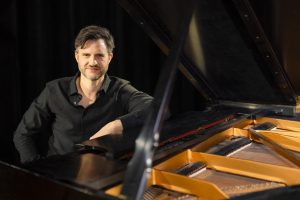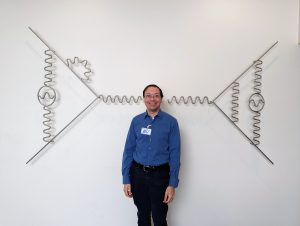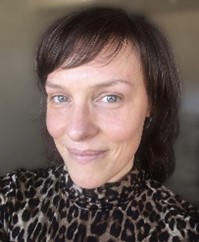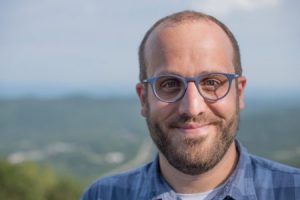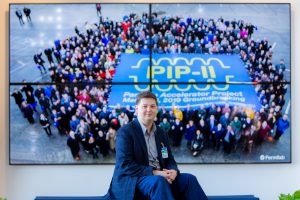Mischa Zupko 2024
Mischa Zupko, adjunct faculty member of the School of Music at DePaul University, will collaborate with Fermilab scientists and members of the Chicago-based Civitas Ensemble to create music based on scientific models in particle science.
Zupko is a third-generation composer. Zupko draws inspiration from themes of the universe, cosmic phenomena and mathematical models. “From what I have come to understand, the ability to imagine, in a physical sense, phenomena relating to the behavior and interaction of elementary particles is impossible, but the attempt to imagine, is where the beauty lies,” he said.
Past FRA Guest Composers
Roger Zare 2023
Roger Zare, creates compositions for full orchestras, wind ensembles and single instruments, while serving as a visiting assistant professor of music at the Hayes School of Music at Appalachian State University.
“I love the mind-blowing nature of what science is – where it is able to describe things that we’re almost unable to touch ourselves and explain things in the universe,” said Zare.
A piano solo, Quantum Field, premiered at the Beyond the Visible exhibition at Schingoethe Center Museum in February 2024.In May 2024 the Batavia Wind Symphony premiered Zare’s Deep Underground composition that will be performed by a consortium of high school, university, and community groups across the nation in 2024-2025.
Roger Zare’s Deep Underground composition is featured in Scoring Particles and Expanding Outreach.
Suzie Shrubb 2022
Suzie Shrubb is a composer as well as a classical and improvising musician who plays the piano and the oboe. They currently work with the Hurly Burly Theatre in the UK.
“I feel like a musical space is a context through which we can take these particle physics systems that are a description of a reality and then translate them. It’s an expression and a relationship,” said Shrubb.
David Biedenbender 2021
David Biedenbender, a Michigan State University professor of composition, has experience with the intersection of physics and music. He created a choral work, Flux, to sonify that concept, also known as rate of flow. His composition Cyclotron is inspired by the particle accelerator at the National Superconducting Cyclotron Laboratory at MSU.
“My hope is to use music to help those who may not know much about the subatomic world learn about and reflect on some of the amazing phenomena, questions and experiments that happen at Fermilab,” Biedenbender said.
.
David Ibbett 2020
David Ibbett was the first guest composer at Fermilab. He is a composer, educator and musical advocate for science. He composes electrosymphonic music: a fusion of classical and electronic styles and musical strands met with inspiration from the work of scientists: sonified data, musical metaphors for scientific concepts, and experimental sound and images from research.
Ibbett explains why he was drawn to the ubiquitous and strange particles known as neutrinos. “They don’t quite fit,” Ibbett said. “They have mass, but they shouldn’t, according to the Standard Model, and this raises all sorts of questions and opportunities to take our physics understanding further.”




